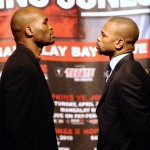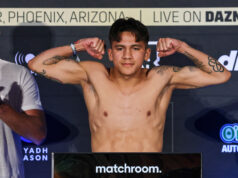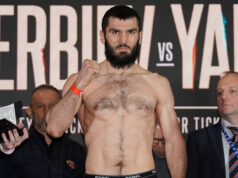
It is fascinating to listen to Bernard Hopkins and Roy Jones Jr. They might not belong on a pound-for-pound list these days, but word-for-word they could challenge Charles Barkley. In the interview game, Hopkins and Jones are as good as anybody.
They provided an insightful double-feature a couple of days ago in a conference call about an April 3 fight. Their rematch at Las Vegas’ Mandalay Bay has generated everything from outrage to concern. The mixed response from media and fans is at least predictable and perhaps inevitable whenever legends closer to Hall of Fame induction than their primes prepare to fight.
A couple of examples:
Jones, as wise as he once was quick, acknowledged he is aware of fears some have for his well-being.
“I take my hat off to them,’’ said Jones, 41, who has been stopped three times in the last six years. “I thank them for being concerned about me, because that’s a great thing.’’
Then, there was Hopkins, funny, controversial and just as wise.
“This is not some clown reality-show where two wrestlers, two boxers, two old entertainers, two old singers square off,’’ said Hopkins, 45, who is favored to avenge a 1993 loss by decision to Jones. “This is the real deal.’’
I suspect the call will prove to be better than the fight.
It also is important for a lesson left unsaid, yet current and perilous if ignored by the best-and brightest in today’s generation. I hope Manny Pacquiao and Floyd Mayweather, Jr., were – are — listening. The Jones-Hopkins rematch should have happened a decade ago. Pacquiao-Mayweather should have happened on March 13.
For each should-have, the circumstances are different. But Jones and Hopkins can’t redo the specifics — an unresolved dispute over money – that led to a breakdown of a rich, relevant rematch that might have led to another.
“I was the undisputed middleweight and he was the undisputed light-heavyweight,’’ Hopkins said. “It would have been great.’’
It could have been one or two for the books.
But Hopkins, Jones and the sport were robbed of that opportunity by financial percentages that today are forgettable, if not petty. The real loss, perhaps, was in a percentage of fans. Nobody remembers the first fight on a dreary night at RFK Stadium in Washington D.C. on the undercard of a main event featuring a Riddick Bowe stoppage of Jesse Ferguson.
“I still remember Larry Merchant saying that if the wind wasn’t blowing in the stadium, everybody would have gone to sleep,’’ Hopkins said.
Many of them did during the years when Jones and Hopkins matured into the best of their trade. Nearly 10 years ago, they were the fight the public wanted, yet didn’t get. It would have been a rematch only in name. In fact, it would have been an awakening for a public and media increasingly turned off by boxing.
Since then, the sport has repeatedly attempted to resurrect itself. There are promising signs, but the state of the game returns to the critical list if Pacquiao-Mayweather follows the path of the Hopkins-Jones rematch.
Throughout the conference call Wednesday, I couldn’t help but imagine another call, 10 years from now, with Mayweather and Pacquiao, both forty-something and both trying to sell their first fight in 2020 with awkward explanations about why they didn’t fight in 2010.
The issue has been Mayweather’s demand and Pacquiao rejection of Olympic-style drug testing. In a few months, it might be about money, especially if Mayweather beats Shane Mosley on May 1 in front of a bigger pay-per-view audience than the announced 700,000 for Pacquiao’s victory over Joshua Clottey.
There are projections of three million for Mayweather-Mosley. Even if it is half of that at 1.5 million, Mayweather could return to the bargaining table with an argument that he deserves the lion’s share, instead of the 50-50 which had been agreed upon before talks broke down over random blood tests.
Ten years from now, that and who-knows-what-else could be hard to explain. But the lesson is there, thanks to Hopkins and Jones, whose fight is all about timing. It’s the wrong time for them, but still the right one for Pacquiao and Mayweather.
NOTES, QUOTES
· Andre Dirrell might be poised for stardom. He has tough challenge in the super-middleweight tournament Saturday against Arthur Abraham on Showtime. But Dirrell, who grew up in Flint, Mich., will have a hometown crowd and plenty of motivation against the rugged Abraham in Detroit. Dirrell, who is anxious to prove he was robbed by a decision in a loss to Carl Froch in his last outing, is versatile enough to upset Abraham.
· The annual Celebrity Fight Night, Muhammad Ali’s fund-raiser for research in the battle against Parkinson’s, raised $5 million Saturday night in Phoenix. In 16 years, the event has raised $65 million.
· Top Rank is keeping Jose Benavidez, a 17-year-old junior-welterweight from Phoenix, busy. After pushing his record to 3-0 in Dallas on March 12 — the night before Pacquiao’s victory over Clottey at Cowboys Stadium, Benavidez is scheduled for a fight on April 10 against an undetermined opponent at The Hard Rock in Las Vegas.
· And as a Golden Boy partner, Hopkins is also a promoter, but he didn’t have anything to do with the promotional label for the fight with Jones. It’s called The Rivals. “I would have named it Personal,’’ said Hopkins, who says his anger for Jones is real.









